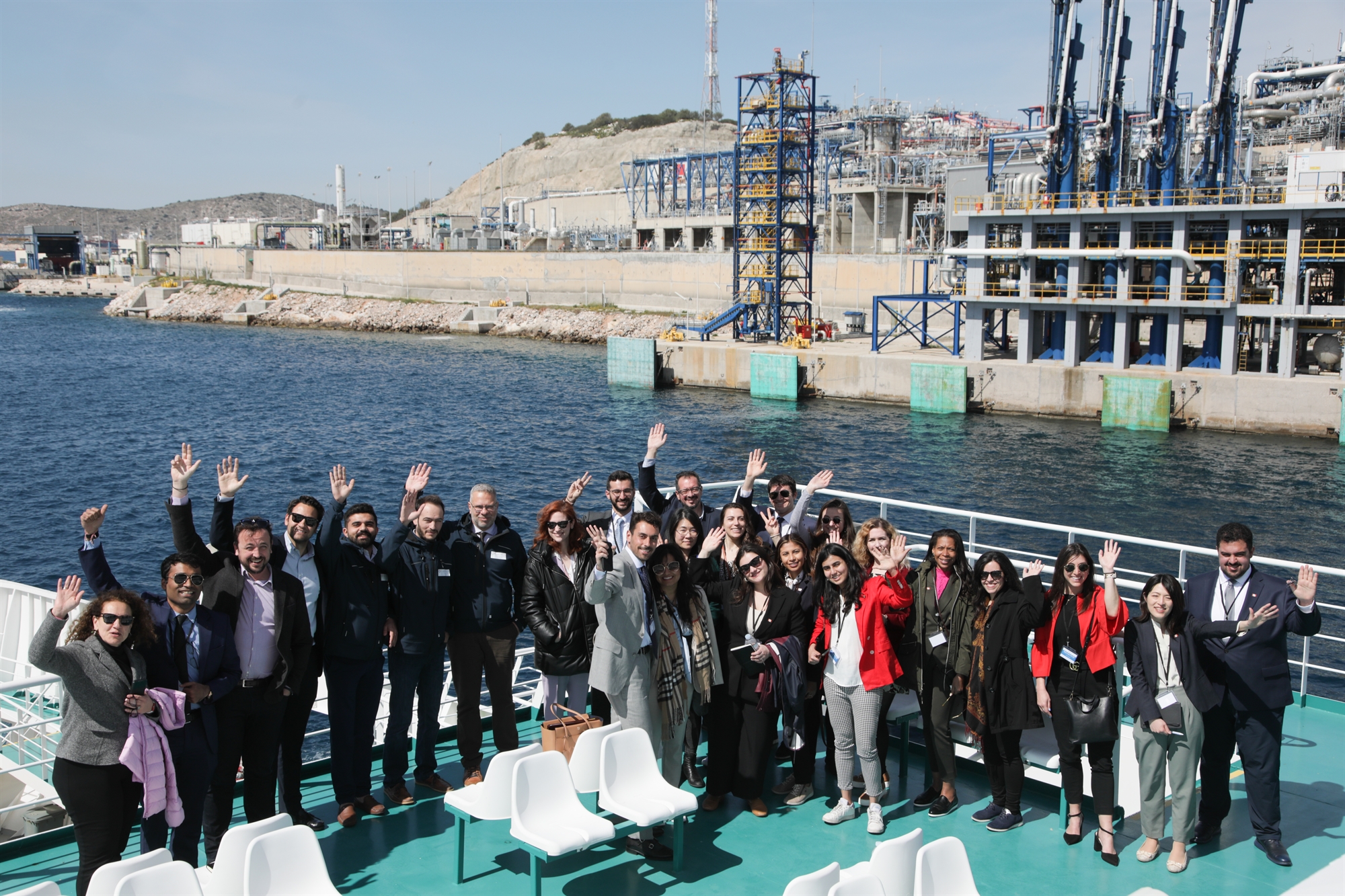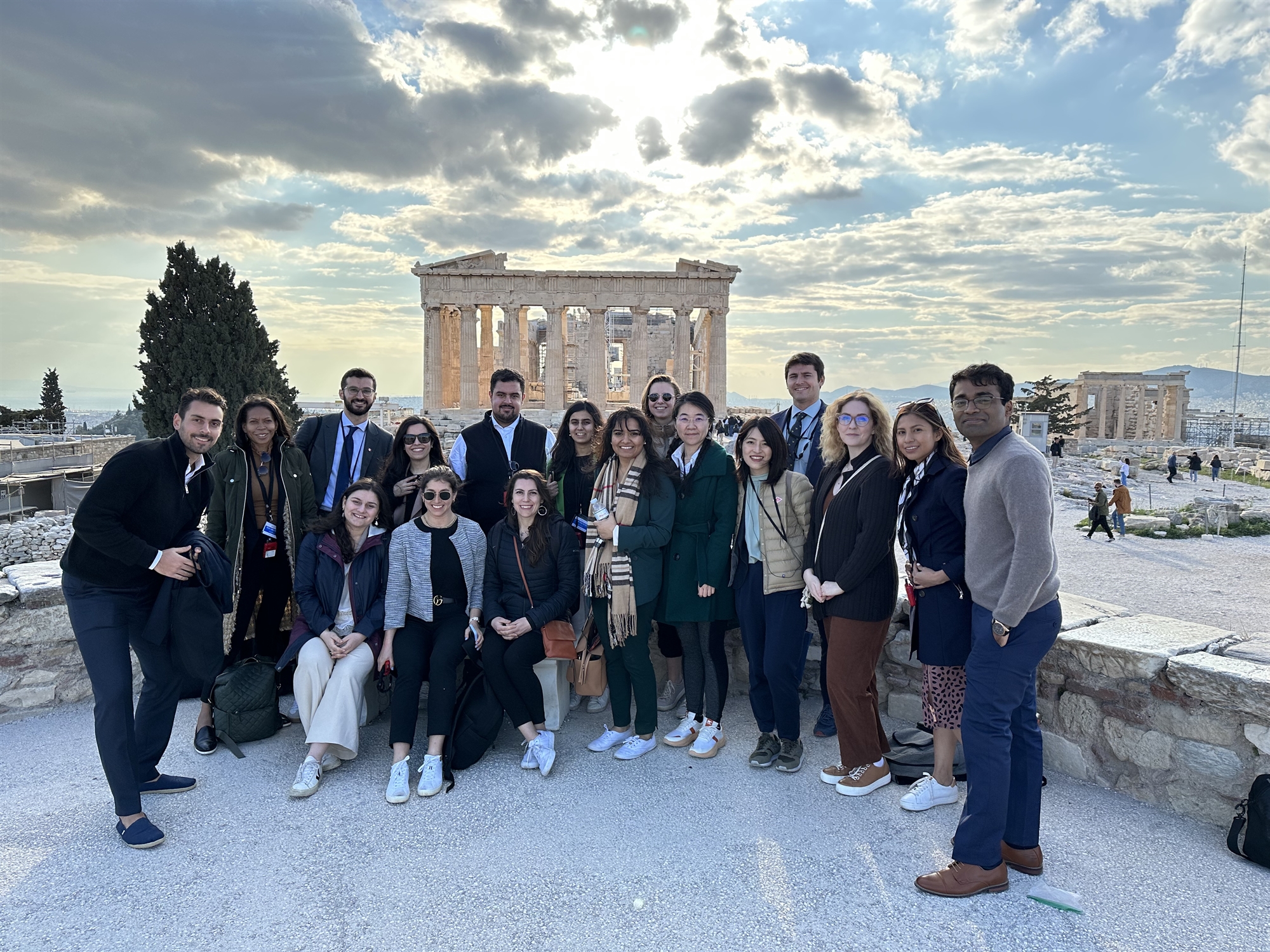
“My parents came to Greece from a village in Northern Epirus in the 90s, dreaming of a homeland and fighting to maintain their Greek identity in Albania,” says Anastasia Thanoswho was born in Athens. “However, in 2009, shortly before the economic crisis hit, they decided to immigrate again, hoping for a better future for their children. That’s why we went to the USA.” its roots Dimitris Papachristou they reach Kyriaki in Boeotia, near Delphi, on the paternal side, and Crete on the maternal side. For professional reasons, the family spent many years in various European countries. His grandparents Constantinou Angelakis they came from Thessaloniki and Messinia. He is a second generation Greek American.
Three young people met in the historical Tufts University Fletcher School of International Affairsin Medford, Massachusetts, where they continue their graduate studies. The common denominator was not only their Greek origin, but also their deep love for our country, which is not self-evident. “Yes, we love Greece, but that doesn’t mean we don’t see it clearly as a place of strong contrasts, where black and white coexist in almost everything. On the one hand, the ancient charm, history, hospitality, warmth of its people, and on the other – a rigid state system, bureaucracy, brain drain, often corruption. Can we put in our own pebble to tip the scales for the better.” as Anastasia usually says.
The idea of their own “little stone” came up last summer in a small cafe on Plaka Lasithiou, across from Spinalonga, where they used to party. There, drinking tsikoudia, they decided to take the initiative: the implementation of an educational trip, “Trip to Greece”so that their fellow students who will participate in it “see Greece outside the window through an authentic experience that is very difficult if not impossible for the average tourist to experience”, as Konstantin says. Every year, the American University makes several such trips, mainly to Israel, Japan, Central Asia and Colombia. But never in Greece.

Three fellow students and friends turned heaven and earth to be able to realize their idea. They reached out to financially wealthy members of the Greek American community, secured sponsorship, and the trip began to be planned. Their purpose? To build bridges. “Tufts is one of the world’s leading universities in the study of international relations, political science and diplomacy, and it is certain that those who pass through its halls hold leadership positions in governments, embassies, international organizations, multinational corporations. By showing our fellow students the best, most dynamic part of our homeland, we are, in fact, investing in the future, in tomorrow’s philhellenes.” Dimitris explains. “And since Greece means the Acropolis/Good Food/Financial Crisis triptych to the average American, we wanted to break the stereotypes, expand the knowledge of the participants in the Greek Campaign and other areas that go beyond classical antiquity. How many people know, for example, the role that the revolution of 1821 played in shaping the geopolitical map of Europe at that time? Or the excellent work being done in many areas of business and production? It’s not just tourism…
Various aspects
The ten-day program was compiled with the invaluable help of Alexandra Teligada-David and Sophia Antoniadu, co-founders of Discover Greek Culture, and on March 18, a group of seventeen students from the USA, India, Japan, Venezuela, Taiwan. , Mexico and Kuwait arrived in Greece. The emphasis, of course, was on culture – with visits to museums, archaeological sites and new monuments, from the Acropolis, Mycenae and Aigues to Meteora – but not only on this. Representatives of the generation that will be called upon to shape the world of tomorrow met with government officials and businessmen, saw various aspects of Greek reality in terms of foreign policy, economy, investment, energy, the refugee crisis, human rights. .
They visited, for example, the Revitussa LNG Terminal, a small island located in the Pachis Megaron Bay, 45 km west of Athens (one of the twenty-eight equivalents operating in Europe), to see how energy is becoming a key factor in an international environment. development and quality of life, DESFA is strengthening one of the country’s critical energy infrastructures to efficiently cover its current and future energy needs. After visiting DESFA’s head of corporate affairs, Fernando Kalligas, they wanted to know what specifications and what protocols would ensure the safety of workers on the island, residents of nearby areas, and the environment. “in a country of natural beauty, which, precisely because of this, is largely based on tourism.”
The initiative belongs to three students of Greek origin who managed to secure sponsorship and realize their idea.
At a meeting with representatives of the Greek Shipowners’ Union – Antoni Laimos, Dimitris Fafalio, Nikola Veniami, Yiannis Xilas and Katerina Peppa – they were impressed to hear that Greece today is the leading shipping country in the world, as Greek shipowners have 5,514 ships. control roughly 21% of the world’s fleet in terms of tonnage (which – another impressive element – increased by 7.4% during the pandemic).
In addition, the fleet owned by Greece accounts for 59% of the fleet controlled by EU member states. and that every third ship currently under construction in the world will be handed over to a Greek shipowner. Their questions mainly focused on the safety of merchant shipping, competition from growing Asian shipping, and environmental sustainability.

In the hall of Kapodistrias of the Ministry of Foreign Affairs, where the bust of the first Greek governor stands, Minister Nikos Dendias presented to them the priorities of Greek foreign policy, emphasized the common point of view of Greece and the United States on most international issues, including Ukraine, explained how the earthquake in Turkey “changed Greek-Turkish relations, creating a completely different reality,” and pointed out that “the European Union cannot remain under the protective military umbrella of NATO and the United States indefinitely, but must develop its own protective mechanism. During the trip, Tufts students also had the opportunity to see, among others, former Prime Minister, former Vice President of the European Central Bank and academic Loukas Papademos, GEETHA head General Konstantinos Floros, Digital Government Minister Kyriakos Pierrakakis, Athens Mayor Kostas Bakoyannis and Minister migration and asylum Noti Mitarakis, will be accompanied through the Greek Parliament by MP Dimitris Kayrides to taste authentic Greek flavors in historical shops such as Jasemi and Cafe Abyssinia in Athens or Euphrosyne in Kastraki Kalambaki Sara, Sam, Diana, Abdulmohsen, Shai, Asutos, Diya and the rest of the students could not hide their excitement.
“My participation in the Greek Campaign was a one-way street due to the unique geopolitical position of your country,” Ariel Fanger tells K.. “Understanding Greek history is the key to understanding almost all political systems and institutions. I was looking forward to visiting the birthplace of democracy, with such a rich culture, distinctive architecture, such diverse landscapes and delicious food. I believe that such initiatives further strengthen the already good Greek-American relations and, for me, that this experience will help me become a more accomplished professional.”
For her Fatma Siddique this trip was not only extremely interesting, but also emotionally rich. “I am a Turkish Cypriot. I was born in Famagusta. My mother is from Trebizond and speaks Pontic. I grew up in the Bronx, New York listening to Greek and Turkish, seeing how Greeks and Turks live in harmony, loving and protecting each other. I took dance lessons at a Greek club across the street from our house. By watching my friend Maria, I also learned zeibekiko. Therefore, I wanted to come to a country whose culture greatly contributed to the formation of my personality, in order to get to know it better. And I’m glad for that.”
“We opened the way”
Anastasia, Dimitris and Konstantinos have every reason to feel satisfied. Tufts’ first educational trip to Greece was a complete success. Will there be a sequel? “That’s the point,” all three say. “We have opened the way, we hope that other Greek or Greek American students will take over and the bridges will not be cut. In addition, Fletcher has the Konstantinos Karamanlis Chair of Greek and South East European Studies and this creates a very important connection.” “Educational tourism is not seasonal tourism, and we believe that Greece is ideal for organizing such trips – for students of social and humanitarian specialties, fine arts, philosophy and other scientific areas. For us, that means extroversion!” add Alexandra Teligada-David and Sophia Antoniada from Discover Greek Culture. “After all, culture is also politics…”
Source: Kathimerini
Ashley Bailey is a talented author and journalist known for her writing on trending topics. Currently working at 247 news reel, she brings readers fresh perspectives on current issues. With her well-researched and thought-provoking articles, she captures the zeitgeist and stays ahead of the latest trends. Ashley’s writing is a must-read for anyone interested in staying up-to-date with the latest developments.